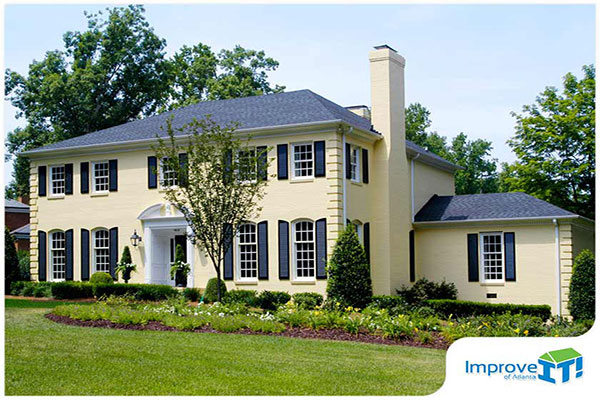Fires are an unpredictable hazard, but that does not necessarily mean you can’t do anything to prevent roof fires or the risk of fire damage to your roofing. Of course, there are no foolproof ways to ensure that no fire will ever occur in your home. But by making the right design and material choices and regularly maintaining your roof, you can reduce the risk of a roof fire.

Keep in mind that your roof is essential to protecting your family and your home. So when it becomes damaged, it won’t be able to provide the full protection it should be able to give you. Roof fires can be especially damaging to your home, and they pose serious risks as well.
In this article, trusted roofing company ImproveIT! of Atlanta shares some tips that will help you prevent roof fires and minimize the potential damage to your home.
Choose a Fire-Resistant Roofing Material
Roofing materials are designated with specific fire ratings based on their fire resistance ability. These ratings are used by contractors to distinguish the safety level of various roofing materials. Typically, the flammability of your roof will determine how much fire damage it can withstand. That said, you should go with roofing materials that can provide ample protection against roof fires.
Class A roofing systems are the most fire-resistant, while Class C roofs offer the lowest fire resistance. Unrated roofing does not offer any level of protection at all. If you are replacing your roof, make sure that your new roof is composed of Class A roofing materials. You should also consider installing a fire-resistant underlayment if you live in a wildfire-prone area. To know more about your options and the roofing material that best suits your roofing and safety requirements, consult your local roofing contractor.
Metal roofing is one of the top choices for fireproof roofing materials. It does not ignite when on fire, so you can be sure of its Class A fire safety rating. Concrete or clay roof tiles are also a good option since they are naturally fire-resistant, and they can disperse heat easily. As long as the material is installed correctly, it can provide Class A fire protection.
Slate tiles are naturally fire-resistant too. Their thickness is partly the reason for their Class A rating since the material does not chip easily, thus preventing fire to penetrate through it.
Another material that you might want to consider are fiberglass-based asphalt shingles. While the regular asphalt shingles are already fire-resistant on their own, adding fiberglass underlayment can make the structure even more fire-resistant. That’s why asphalt roofing can also obtain a Class A fire safety rating. Keep in mind, however, that asphalt shingles are still flammable even though they are fire-resistant.
Keep Your Roofing Clean
If your roof is cluttered with debris, the debris could possibly catch fire and burn long enough for the roofing material to also ignite. Remember that fire-resistant roofing materials may still ignite if they are exposed to extremely high temperatures for a long time. To avoid the accumulation of debris, make sure to have your roof regularly cleared of debris.
Keep Your Chimney Clean
Don’t forget to clean your chimney as well. Because every time you light a chimney fire, partially combusted materials go up the chimney and stay there to form part of the debris and soot. Given the right conditions, these partially combusted materials and any other organic debris could ignite and send sparks to your roofing.
Ensure the Area Around Your Home Is Clear
Be mindful of the area around your home. Things like wood, grass, leaves, plastic and windblown debris can act as fuel and help create fire. Although these may not be directly found on your roofing, there is still a possibility that fire might get blown onto your roof during an outbreak. To reduce such risk, you should see to it that trees around your home are regularly trimmed. Do not stack firewood so close to your home, and minimize attached structures that could potentially spread fire to your home.
Fix Gaps on Your Roofing
Existing damage to your roofing, such as gaps and cracks, could compromise even a fireproof roofing material. Missing shingles, for instance, will allow fire to reach the inner structures of the roof, making the entire roof susceptible to fire. Make sure to have any gap on your roofing fixed immediately.
Inspect Electrical Wiring in Your Home
Problems in electrical wiring are the leading cause of attic and roof fires. That said, it is recommended to have your electrical wiring checked by a professional if you suspect that you may have faulty wiring or if your home is old. Also, look out for signs such as flickering bulbs and light fixtures that suddenly fail to turn on. These could indicate burned wires in your attic.
Check Your Ceiling Insulation
Ceiling insulation is not necessarily a fire hazard. But when it is installed poorly or an electrical cable was not properly installed alongside a pre-existing insulation, then it becomes a problem. During a roof inspection, make sure that your contractor checks if your roofing material has sufficient insulation around the vent pipe for generators. If the vent pipes lack sufficient insulation, the heat coming from these pipes could deteriorate the roofing material. Also, when high winds occur, fire could start in this part of your home and cause fire damage to your roofing. With the help of a reliable contractor, you can make sure that your ceiling insulation is not placed too close to a heat source.
ImproveIT! of Atlanta has been in business for several years, providing top-notch roofing services to local clients. From roof replacement to roof insurance claims, you can count on our crew to carry out tasks to the highest standard. We handle projects professionally, so feel free to approach us for inquiries and consultations. Call us at (770) 612-5635 or fill out our contact form to request a free estimate. We serve customers in Sandy Springs, Marietta and Alpharetta, GA.





